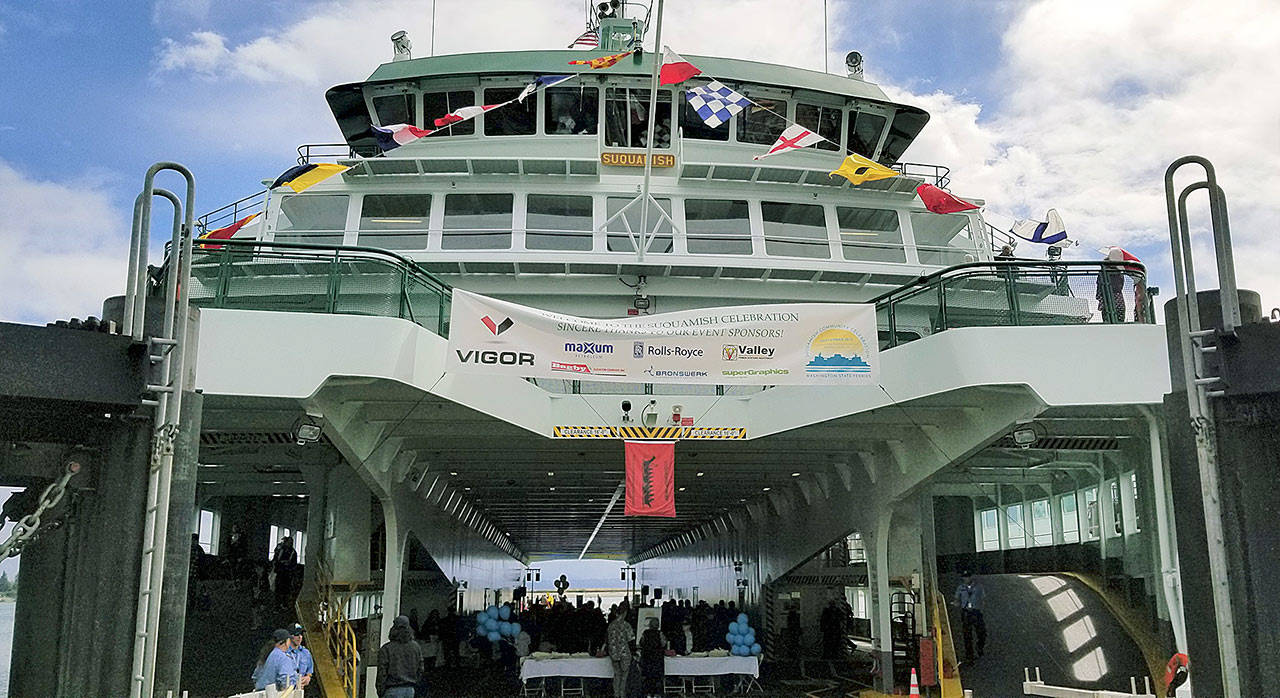Washington State Ferries welcomed everyone aboard for a tour of their newest vessel, the M/V Suquamish, on Saturday, Sept. 22 during a community celebration at WSF’s Eagle Harbor maintenance facility.
The Suquamish carried a price tag of more than $120 million and will go into service in the coming days on the Mukilteo-Clinton route. It will also work as a relief boat for other runs when necessary.
The ferry bears the name of the Suquamish Tribe, something that the tribe’s chairman, Leonard Forsman, found fitting.
“We’re really proud of the fact that the new ferry is going to be named after our ancestral name for our people here in Suquamish,” Forsman said. “It’s only fitting that these ferries that move around on our ancestral highways, our trade routes and our fishing grounds, carry our name.
“Our elders and our young people are very excited about the commissioning of the ferry,” Forsman said, adding that the tribe was looking forward to putting their final blessing on the vessel and seeing it enter service in the area.
Brian Mannion, a project manager for WSF, said in an interview that sea trials for the Suquamish are going well.
“Our engineers were working on getting that system dialed-in, along with a lot of our normal testing and trials — crash stops, kind of pushing the boat to the limits, making sure all the systems works— and outfitting.” Mannion said, adding that outfitting the vessel was no small undertaking. “It’s basically like stocking a small city with consumables for customers, with tools for the engine room, with all of our life jackets [and] life-saving equipment.”
The Suquamish is the newest of four Olympic-class vessels in the WSF fleet, joining the ranks of the Tokitae, Chimacum and Samish. The new vessel will stand out against its predecessors, however, in that it will be the first vessel in the fleet to incorporate engines that adhere to Tier 4 emission standards.
The engines will actually treat exhaust with urea before expelling it out the ferry’s stacks, thereby reducing the levels of particulate matter and oxides of nitrogen in the exhaust. This will in turn make the Suquamish the cleanest-running vessel in the fleet.
Genevieve Fritschen is a 25-year veteran with WSF and one of the captains tasked with helming the Suquamish during sea trials. She said even though the new ferry runs cleaner, the Suquamish behaves much in the same as any of the other vessels in the Olympic-class fleet.
“You wouldn’t notice anything. Nobody is going to notice anything. The sea life, the birds, the air, they’ll notice it, but nobody else will,” she said.
Fritschen also noted that the Olympic-class of ferries might be her favorite in the fleet for their maneuverability and the creature comforts for the crew.
“I love them. I hope they keep building them,” she said.
At the event, Fritschen was recognized by officials from the Suquamish Tribe and bestowed with a traditional style blanket as thanks for her work on the project.
State Rep. Sherry Appleton was at the event on Saturday as well and expressed her support for WSF’s intent to seek funding from the Legislature to build five more Olympic-class ferries.
“Now we need a few more boats so that we have backup boats,” Appleton said, “because this is our lifeline. If we don’t have ferries, we can’t go any place. Think about all the ferry communities around Puget Sound that depend on the ferry system.”
The high point of the event came in the form of a performance by members of the Suquamish Tribe, who sang traditional traveling songs and a gathering song. The voices of the tribe resonated through the steel belly of the ferry, punctuated by drumbeats, heralding the M/V Suquamish’s arrival in the fleet.



